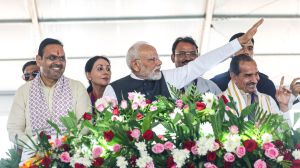Marwari diaspora takes a break from market to cheer their IPL team
These days, in the rush-hour din inside Mumbai’s sweaty, jam-packed local trains, cricket talk rules.

These days, in the rush-hour din inside Mumbai’s sweaty, jam-packed local trains, cricket talk rules. Nothing unusual in IPL season. Only, much of it is in Rajasthani.
Between calls about the Sensex and wholesale-retail rates, Marwari traders converse animatedly about the exploits of “their team” in the Indian Premier League — the Rajasthan Royals.
For years, the migrants from the desert state were stereotyped as money-minded cricket enthusiasts whose association with the game was confined to speculation over its odds, while the locals, with a rich cricketing heritage, spoke about Shivaji Park, cover drives, pulls and glances.
But the impact the Jaipur-based franchise has had in the inaugural IPL season has changed equations. Rajasthan Royals have not only put the game’s much-neglected region on the cricket map, but have also given the state’s diaspora across the country a new association.
During the Rajasthan Royals versus Delhi Daredevils semi-final at Wankhede, large groups of men sporting royal blue pughris and women in laheriya saris were among the spectators. Though merchandising hasn’t really caught on, splashes of Rajasthan Royals’ colours (jerseys and T-shirts) could be spotted in the stands.
Skipper Shane Warne had said earlier that he would have preferred playing the semis and the final in Jaipur, but on Friday he was pleasantly surprised by the support in Mumbai. “With the crowd behind us, it really helped,” he said after his team defeated the Delhi Daredevils by 105 runs.
About the home-away-from home feeling that the Rajasthan Royals are enjoying in Mumbai, the franchise’s CEO, Fraser Castellino, says he isn’t surprised.
“Considering the huge Marwari community in Mumbai, there was never a doubt in my mind about the support we would get. Why just Mumbai, people from Rajasthan are spread across the world and we will get support wherever we go,” he says.
The epicentre of this recent shake-up in the city’s cricket loyalties is in Mumbadevi, a congested business area that houses more than a lakh Marwari traders who deal in metal, cloth and jewels and complete transactions worth crores every day.
Sunil Kothari, 39, with roots in Mount Abu, has lived in Mumbai for over five decades. “This is our karmabhoomi but how can we forget our janmabhoomi,” says Kothari, who owns Bombay Metal Exchange Limited. “I prefer watching the game on television but several of my Marwari friends went to the stadium in traditional wear.”
Not far from the Kothari establishment is 42-year-old brass wires trader Suresh Jain. “Even though the top performers for Rajasthan Royals have been foreigners, they are playing for Rajasthan and that makes me root for them with all my heart,” says Jain.
Copper merchant Kunarmal Giriyamehta says the Royals’ IPL success will inspire local players from Rajasthan in the future.
The tight-fisted approach of the Jaipur-based franchise during the auction and the business model of getting the best by spending the least haven’t gone unnoticed at Mumbadevi. “Overspending has never been a tendency that could be associated with a Rajasthani,” says Hemant Kataria with a smile.
Organisers at DY Patil Stadium in Navi Mumbai, the venue of IPL’s grand finale on Sunday, say there is a flood of queries about tickets and group bookings from Marwaris, many from outside the city. Some have even asked if there is space outside the stadium to park luxury buses.




- 01
- 02
- 03
- 04
- 05


























